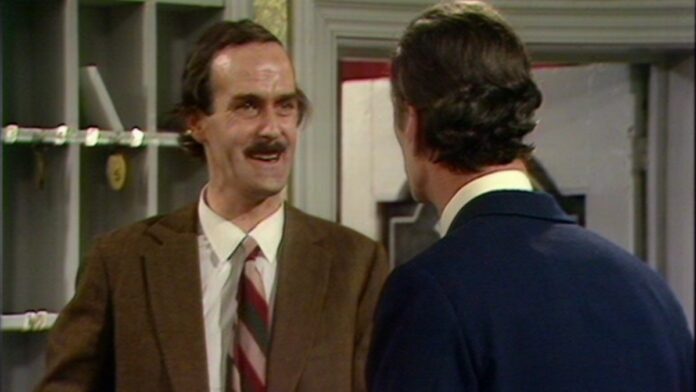Not every television show can attribute its inspiration to a single, pinpointed event.
Most shows are the result of a blend of ideas contributed by various writers and actors.
However, every so often, there emerges an individual, a place, or an event so distinct that it ignites a creative spark.
In 1971, the Gleneagles Hotel in the English coastal town of Torquay was the site of one such spark.
The hotel’s owner at the time was Donald Sinclair, a man who, according to his guests, could claim the title of the rudest person in existence.
Sinclair’s interactions with his guests included flying into fits of rage when he spotted his construction crew taking a break, tossing a timetable at a guest who inquired about the bus schedule, criticizing an American guest’s eating style, and even relocating a briefcase to the garden on the off chance it might contain a bomb.
Ironically, the guest who made these observations was none other than John Cleese, a member of the renowned comedy troupe Monty Python.
Cleese was so captivated by Sinclair’s eccentric behavior towards his colleagues—Terry Gilliam’s dining style had been the subject of criticism, and Eric Idle’s briefcase had been exiled to the garden—that he not only continued to stay at the hotel after the Pythons moved on but also brought his wife, Connie Booth, back to the hotel to further observe Sinclair’s unique managerial approach and take notes.
After parting ways with Monty Python, Cleese decided to create a new project for the BBC, and the memory of Sinclair was still fresh in his mind.
It was from this experience that Fawlty Towers was born.
In the realm of television, Fawlty Towers is to sitcoms, what The Sopranos is to contemporary cable drama, or The Simpsons is to animated comedies.
It is widely acclaimed as one of the greatest shows ever produced and was even named the greatest British television series of all time at one point.
Despite consisting of just twelve episodes spanning two series, its influence can be seen throughout thirty years of British comedy, and it has served as an inspiration for American sitcoms such as Cheers, Frasier, and 3rd Rock From The Sun.
What is it about this show that has earned it such adoration and made it timeless and influential?
We invite you to stay with us as This Was Television explores the entire series. But please, let’s not mention the war.
“A Touch Of Class”
Series 1, Episode 1
Originally aired: Sept. 19, 1975
Summary: The aristocratic Lord Melbury’s arrival at the hotel prompts Basil to excessively fawn over him while neglecting and annoying other guests. Meanwhile, Sybil instructs Basil to hang a picture.
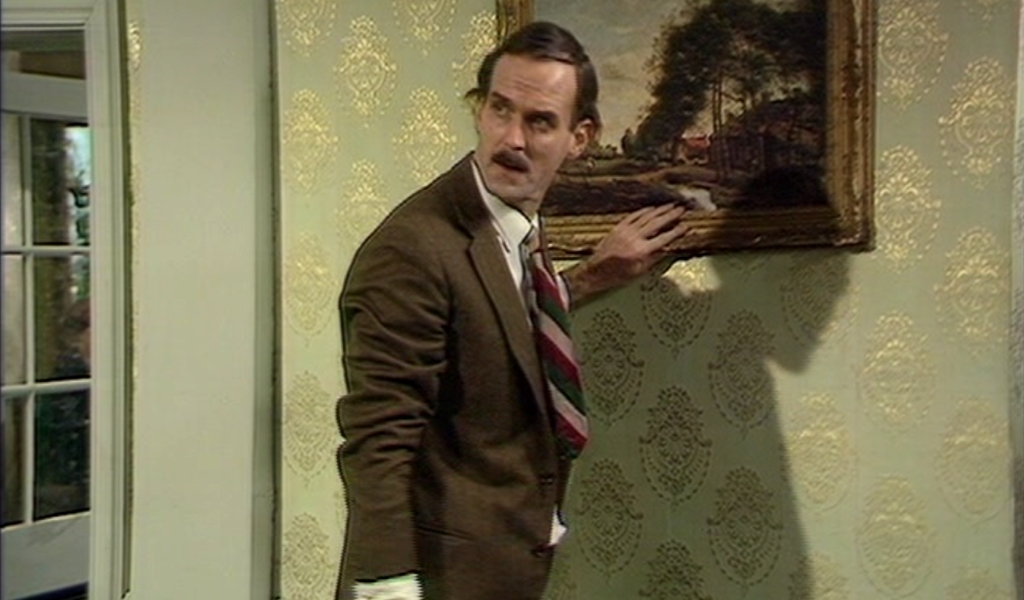
During a 30th-anniversary celebration of Fawlty Towers, John Cleese shared an anecdote about the initial rejection the show faced.
After Cleese and Connie Booth presented the first script to the BBC’s creative team, it received swift rejection.
The critique included references to “clichéd situations and stereotypical characters” and the belief that the story wouldn’t progress unless characters left the hotel.
Cleese took particular offence at the latter suggestion, as he explained to the Times, emphasizing that “it’s in the hotel that the whole pressure cooker builds up.”
If I had to choose a single sentence to encapsulate what makes Fawlty Towers so successful, there’s no better choice than that one.
The pilot episode, “A Touch Of Class,” exemplifies situational comedy at its finest.
Within the confines of Fawlty Towers, the egotistical Basil Fawlty reigns over his staff and guests with minimal impact, resulting in a plethora of frustrations and misunderstandings beyond compare.
Like many great comedies, Fawlty Towers excels by taking its time to set up its humor.
The episode’s central plot, which revolves around Basil’s aspiration to attract a more upscale clientele than his current guests (“Have you seen the people in Room Six? They’ve never even sat on chairs”), plays out in the background.
Instead, it establishes the hotel’s natural rhythm.
Basil’s wife, Sybil (played by Prunella Scales), assigns him a never-ending list of tasks, leaving him perpetually unable to complete one before another arises.
This brief span manages to introduce running gags, such as forms to be signed, a picture to hang, and Basil’s inability to enjoy his music in peace.
Additionally, it highlights the language barrier between Basil and his waiter, Manuel (played by Andrew Sachs), a good-natured Barcelona native who struggles to comprehend Basil’s meticulous management expectations for the hotel:
The hotel may lack efficient management, but its construction is remarkably efficient.
While other shows have effectively used limited sets in the past—Cheers, for instance, famously remained within the bar during its first season, and in previous TWTV roundtable discussions, I commended Taxi for its lengthy garage scenes—what director John Howard Davies accomplishes here surpasses what Jim Burrows achieved in the pilots of those shows.
Each room in the hotel—the lobby, the dining room, Basil’s office, the bar—is arranged so that you can discern their locations in relation to the whole, creating a sense of enclosed yet expansive space.
In fact, this may be the most finely crafted set ever featured in a multi-camera comedy. It’s no wonder that episodes of Fawlty Towers have been adapted for the stage over the years.
This structure also allows characters to move seamlessly from one room to another without missing a beat.
With the exception of a couple of instances where Basil steps outside the hotel and one occasion where Polly goes into town, there are no scene breaks to interrupt the action.
Basil can transition effortlessly from slapping Manuel in the dining room to answering the bell in the lobby, continuing on to fawn over a guest in the bar, and ultimately ending up brooding in his office.
The set’s design contributes significantly to the show’s momentum, but full credit for the show’s pacing rests squarely on John Cleese.
I don’t know precisely how closely Donald Sinclair resembled this character in real life—apparently, his family took offense at the portrayal—but whatever impression John Cleese gleaned from the man, it was worth it.
From his very first appearance, Basil Fawlty is an unforgettable character, a man who is absolutely convinced of his own self-importance and yet desperately seeks validation.
This duality is effectively demonstrated in his interactions with everyone around him: he condescendingly regards each guest with thinly veiled contempt, but when the seemingly distinguished Lord Melbury arrives, a switch is flipped, and suddenly he bends over backward with eagerness.
(Sometimes literally, considering Cleese’s height and lanky frame allow him to infuse a lot of energy into his movements, especially within the confines of the hotel’s dining room.)
That is until Polly exposes Melbury as a confidence trickster, a revelation that Sybil confirms by revealing a briefcase filled with “valuables” that are actually bricks, a sight that deflates Basil completely over nearly a minute of his desperate pleas for them to stop.
What follows is nothing less than a comedic culmination of everything that has been building for the previous 26 minutes, as the tension that has been coiled within Basil, provoked by every last absurdity—Manuel’s inability to understand a wine list, his inability to find a moment’s peace to listen to Brahms’ Third Racket, his futile attempt to make his coin collection sound valuable—finally explodes in the form of a vehement shout, “BASTARD!” aimed at Melbury.
Cops swarm through the hotel, Melbury is apprehended—intentionally by Polly, unintentionally by Manuel—and everyone collapses together like a stack of dominoes.
Of course, there is an unforeseen consequence, which, as would become a Fawlty Towers trademark, results from a forgotten detail.
Sir Richard, a legitimate member of the nobility with an outstanding reservation, arrives just as this turmoil is unfolding and is understandably so horrified that he promptly heads back to his car.
Basil desperately attempts to dissuade him, and when the car departs, all that pent-up energy finally bursts forth in one spasmodic, vitriolic outburst:
You SNOBS! You stupid, stuck-up, toffee-nosed, half-witted upper-class piles of… PUS!
In any other show, a moment like this would serve as an epiphany for its central character.
However, even with this resolution, there is no peace for poor Mr. Fawlty.
Why? Because even with Lord Melbury gone, there is still a picture to hang and a “lower-class” customer asking for a drink for the fourth time.
There is not a single moment of respite for the owner of Fawlty Towers—and for the Fawlty Towers viewers as well, simply because they are laughing so heartily.
“The Builders”
Series 1, Episode 2
Originally aired: Sept. 26, 1975
Summary: While the Fawlty Towers lobby is undergoing maintenance, a misreading by Manuel causes chaos. Basil must fix the situation before Sybil finds out.
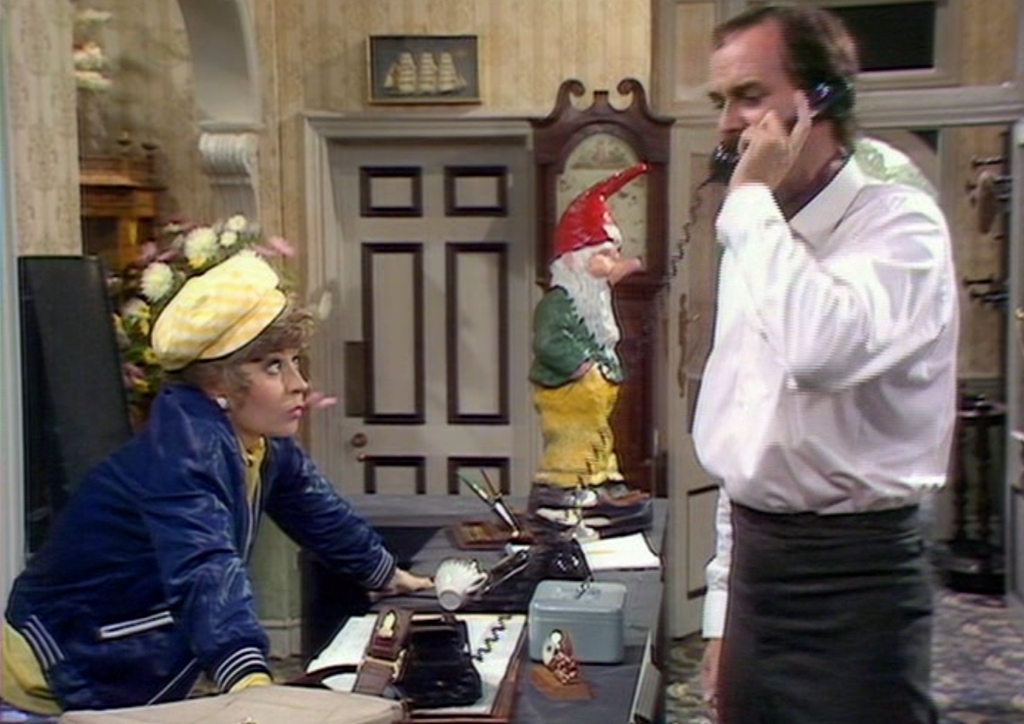
While “A Touch Of Class” may have given the impression that Fawlty Towers was solely John Cleese’s show, “The Builders” proves the golden rule of successful comedy: it thrives on its ensemble.
The Fawlty Towers hotel, by its very nature, served as a backdrop where guests came and went, enabling various adventures.
However, it was the way the hotel’s staff dealt with these people that transformed these encounters into misadventures.
With only four regular cast members, it was a small ensemble, avoiding the common issue faced by larger shows where not every member gets their due.
Of course, it’s still Basil’s flaw that propels the plot. We already know he’s a snobbish misanthrope with little regard for his guests, employees, or wife.
“The Builders” adds to his character flaws by revealing his extreme frugality.
He decides to hire Mr. O’Reilly, despite Sybil’s ban, to handle some renovations while they are on holiday.
To avoid Sybil’s disapproval, Basil plans to have the work done while they are away together.
With Basil absent, Polly is tasked with overseeing O’Reilly’s builders.
However, she decides to shirk responsibility and takes a nap, leaving Manuel in charge of the front desk with instructions to wake her when the builders arrive.
As expected, this plan fails. While “A Touch Of Class” suggested that Basil was partially responsible for Manuel’s incompetence, here he is completely overwhelmed.
Unable to disturb Polly, Manuel attempts to handle the situation himself, leading to fantastic cross-talk with a man delivering a garden gnome Sybil ordered:
“Is this number 16?” “No, this lobby, 16 upstairs.”
“Who’s in charge here?” “No, charge later, after sleep.”
“Number 16!!!” (Stares at the gnome) “You want room 16 for him?!”
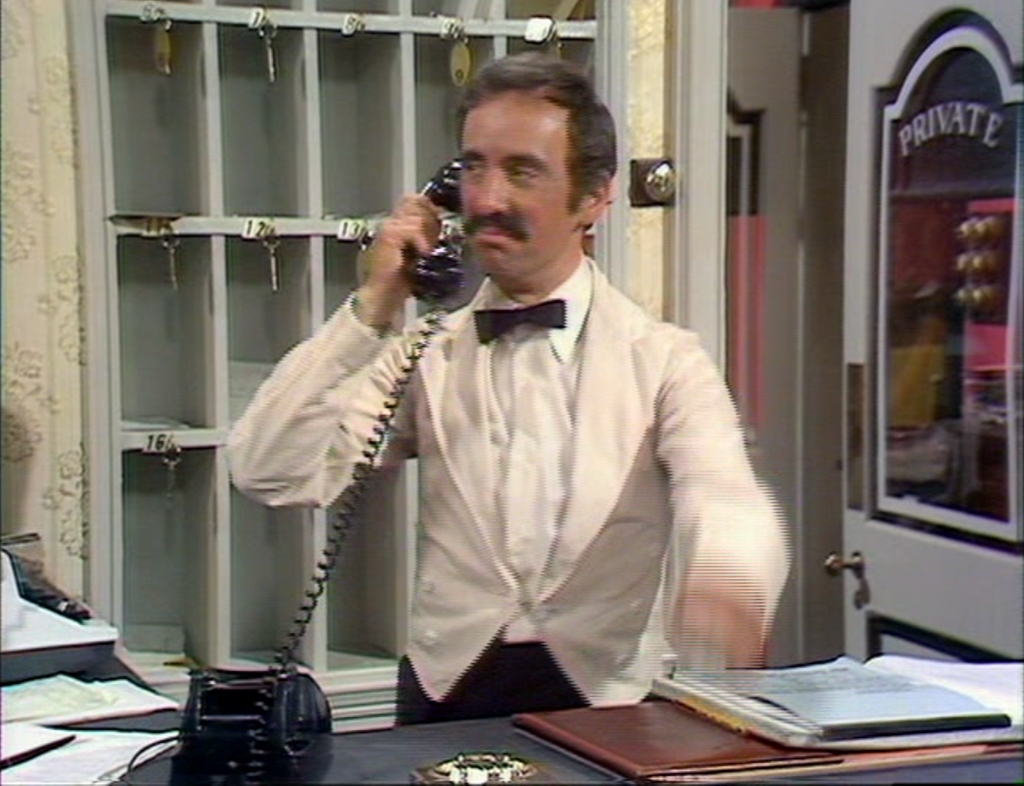
There’s a clear risk associated with portraying Manuel as a complete fool, and the fact that it’s a German actor playing a Spanish character might raise concerns in our politically correct era.
However, Sachs’ portrayal of Manuel maintains an innocence that prevents it from becoming excessively offensive.
The humor doesn’t stem from caricature but from the fact that Manuel is clearly out of his depth, and the harder he tries, the more he worsens the situation under the supervision of his overbearing boss (a boss unafraid to delegate his undesirable tasks, exemplified by the “hideous orangutan” incident).
Nevertheless, Basil faces his own reckoning when he witnesses what O’Reilly’s workers have done based on Manuel’s partially understood instructions:
This scene is worth revisiting, particularly for the excellent slapstick between Cleese and Booth, fitting neatly into the tradition of on-screen spouses venting their frustrations.
In both “A Touch Of Class” and “The Builders,” we observe that Sybil is the one person who can silence Basil and even strike fear in him (“She can kill a man at ten paces with one blow of her tongue, how am I not supposed to worry?!”).
We finally catch a glimpse of that assertive side that Basil disparages when Sybil returns for her forgotten golf shoes—left on the front desk despite her explicit instructions to Basil not to forget them.
This is just one of the many clever details that Fawlty Towers incorporates into its episodes to pull from when needed.
The first thing she notices upon arriving at the hotel is O’Reilly’s truck, a sight that immediately ignites her anger, a sight that Basil pretends doesn’t even exist as she enters the hotel.
(Note: The reference to “reptile zoo” and “muck” is unclear without further context and might require clarification.)
This is an awful move on Basil’s part, and Sybil is well aware of it.
It’s difficult to convey the brilliance of Prunella Scales in these moments, as versatile and convincing as Cleese.
Her face bears an impossibly sweet smile when she says, “Would you like to deal with this, Basil?” as Polly attempts to stage a fake phone call.
Her voice carries an ironclad resolve as she promises that he will regret this decision for the rest of his life, reducing him to a schoolboy status.
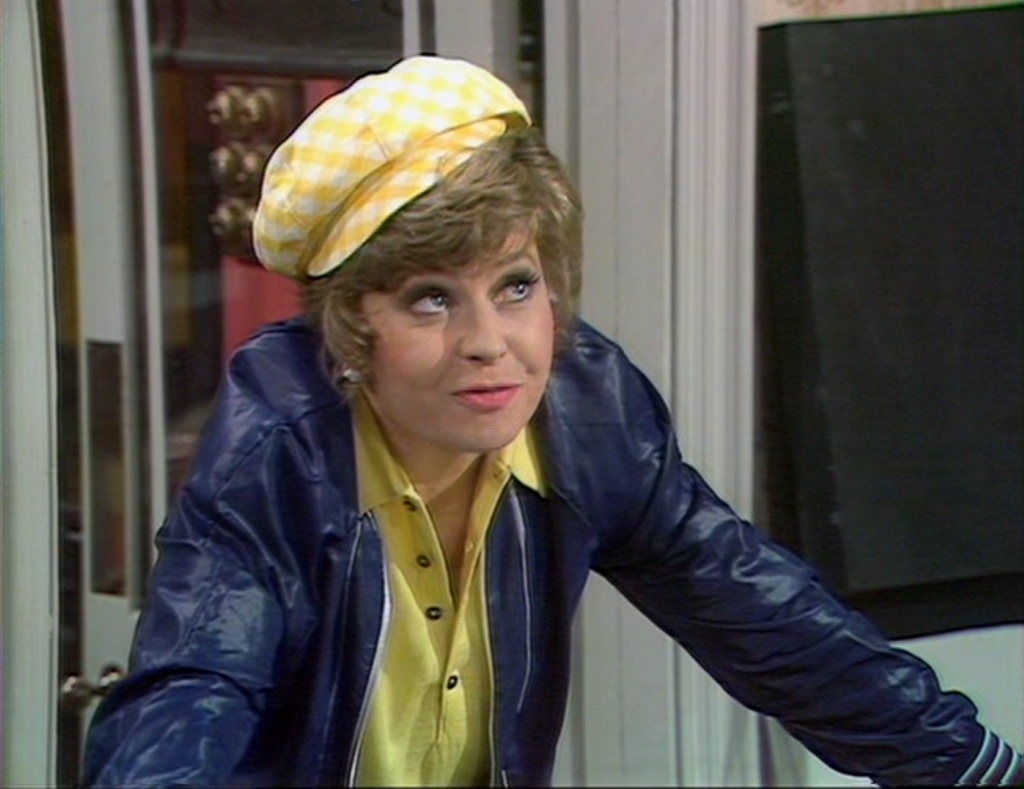
When the cheerful O’Reilly finally makes an appearance, her rage erupts, and she alternates between slapping her husband and hurling insults:
I’ve seen better-organized creatures than you running around barnyards with their heads cut off!
She finishes with a calmly delivered insult once she spots the garden gnome: “I’ll leave him in charge. I’m sure he’s cheap and he’ll certainly be better at it than you are.”
However, Basil believes he still has one card to play.
He pressures O’Reilly into repairing the door against the worker’s initial orders to leave, insisting that all repairs are completed to satisfaction.
Upon Sybil’s return, he proudly shows her the new repairs while his favorite classical music plays in the background (taking full advantage of the enhanced mobility the new doors provide), finally putting her in a position where she must answer to an external authority, the repairman she hired to rectify the mistake.
Is this a shift in the hotel’s power dynamic?
Of course not! As Sybil points out, you get what you pay for.
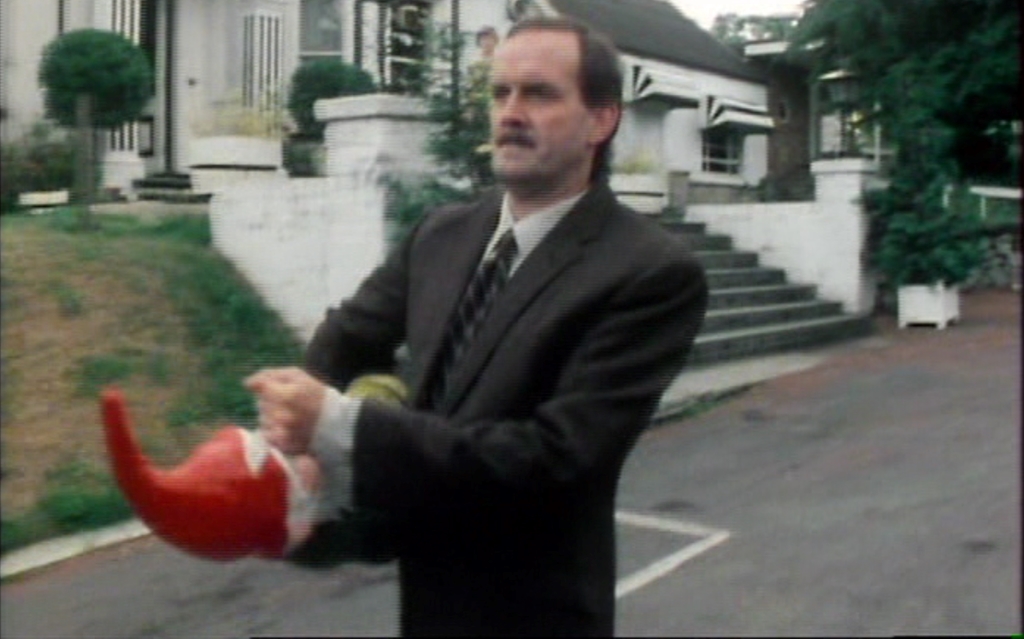
Despite O’Reilly’s impressive speed in completing the renovation, it all falls apart when Stubbs reveals that he inadvertently damaged the load-bearing wall, leaving the entire place on the brink of collapse.
Faced with this dreadful news, Basil makes what he considers the only rational decision: taking Sybil’s garden gnome to O’Reilly, placing it in a rather uncomfortable manner, and possibly making a run for Canada.
This might be his wisest choice of the entire episode.
You Might Like To Read: Roundtable Review: Taxi, “Like Father, Like Daughter”


